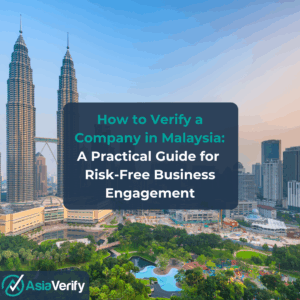A practical guide to verifying Indonesian companies with AHU, OSS, and new GR 28/2025 requirements.

Why Company Verification Matters in Indonesia
Verifying a company in Indonesia is a crucial step in due diligence before entering into partnerships, investments, or supplier contracts. Indonesia has more than 64 million MSMEs, which contribute about 61% of GDP and employ 97% of the workforce. With such a large share of the economy dominated by smaller enterprises, company verification reduces risks of fraud, ensures compliance, and builds trust.
In June 2025, the government issued Government Regulation No. 28/2025 (GR 28/2025), expanding risk-based licensing from 16 to 22 sectors and embedding automatic approval mechanisms (fiktif positif). This makes continuous verification essential, not just a one-time check.
In this blog, we break down the key steps you need to take to verify a company in Indonesia:
1. Check Official Sources for Company Verification in Indonesia
Indonesia uses two main government systems for company data:
1.1 AHU Online (Ministry of Law and Human Rights)
- Legal entity registration database.
- Provides company profiles, directors, shareholders, and incorporation status.
- Access AHU Online here.
Steps to Verify:
- Visit AHU Online portal.
- Select Pencarian/Unduh Data → Perseroan (Profil PT)
- Search using exact registered company name.
- View summary results.
- For detailed reports:
- Profil Lengkap (~Rp500,000 fee).
- Profil Terakhir (~Rp50,000 fee).
1.2 OSS System (Ministry of Investment/BKPM)
- Licensing platform covering NIB (Business Identification Number).
- Validates whether a business is legally licensed and operational.
- Access the OSS System here.
Steps to Verify:
- Request company’s NIB.
- Search via Pencarian NIB on OSS or scan QR code on the NIB.
- Confirm KBLI industry classification and operational status.
2. Consider the Impact of GR 28/2025
GR 28/2025 introduced key changes:
- Coverage expanded to 22 business sectors.
- OSS is reinforced as a central licensing system.
- Licences automatically approved if deadlines are missed (fiktif positif).
- Clearer sanctions and enforcement powers.
Implications:
- More companies fall under OSS oversight.
- Automatic approvals may increase discrepancies.
- Ongoing verification is essential for compliance.
3. Additional Verification Methods
- Review the company website and social media for consistency.
- Contact the company directly for confirmation.
- Use an automated company verification platform to extract company registry data in English, including shareholder and Ultimate Beneficial Owner (UBO) records.
- Check trade associations or chambers of commerce.
4. Best Practices for Company Checks
- Always use exact registered company name.
- Cross-check in both AHU Online and OSS.
- Verify directors, commissioners, and shareholders.
- Use NPWP (tax ID) as a supporting identifier.
- Re-verify periodically, especially after regulatory changes.
5. Quick Checklist
- Company name (exact match)
- NPWP cross-check
- NIB validated via OSS
- Status verified in AHU Online
- Licences valid under GR 28/2025
6. Conclusion
Indonesia’s fragmented verification environment, split between AHU Online for legal entity data and OSS for licensing, requires a structured approach. With GR 28/2025 tightening oversight and introducing automatic approvals, continuous monitoring is now a critical part of verifying a company in Indonesia.
Book a 15-min demo and see how AsiaVerify accelerates onboarding, reduces false positives, and keeps you audit-ready.








